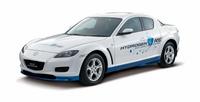Mazda Starts Leasing Rotary Hydrogen Vehicles
Japanese Authorities Approve Leases with Two Companies in the Energy Sector
Tokyo, Japan, Feb 20, 2006 - (JCN Newswire) - Mazda Motor
Corporation received permission from Japan's Ministry of Land
Infrastructure and Transport (MLIT) on February 10, 2006, to begin leasing
the RX-8 Hydrogen RE to its first two corporate customers. These vehicles,
equipped with a rotary engine, feature a dual-fuel system that allows the
driver to select either hydrogen or gasoline with the flick of a switch.
Mazda has started limited leasing of the vehicles and today concluded
leases with two energy-related companies, marking the first lease contracts
of a hydrogen-powered rotary engine equipped vehicle in the world. Delivery
of the vehicles is scheduled to take place in late March
2006.
Idemitsu Kosan Co. Ltd. and Iwatani International Corporation,
both companies operating in the energy sector, have leased one vehicle
each. By the end of 2006, Mazda plans to lease about 10 RX-8 Hydrogen RE
cars to local government and energy companies. In 2003, Mazda exhibited a
RX-8 hydrogen rotary vehicle at the Tokyo Motor Show and received
permission from MLIT in October 2004 to conduct public road tests for
ongoing development and practical application of this advanced technology.
Mazda undertook 29 months of development from the time of announcing the
concept model to achieving the breakthrough, real-world rotary hydrogen
vehicle.
Employing a dual-fuel system, the Mazda RX-8 Hydrogen RE
can run on either high-pressure hydrogen gas or gasoline. This combination
offers excellent convenience because it can be driven in remote areas where
hydrogen fueling stations are not readily available, easing driver concerns
about running out of fuel. In addition, this system boasts great
environmental friendliness--zero emission of carbon dioxide (CO2) gas and
near zero nitrogen oxide (NOx) emission when fueled by hydrogen--together
with the natural driving feel of an internal combustion engine.
It
uses engine parts and production facilities that already exist in Mazda's
inventory, so this innovative engine can be built with a high degree of
reliability at a relatively low cost. The standard monthly lease price is
420,000 yen with tax included (400,000 yen/month without tax) which is
almost half the monthly lease price of a fuel cell vehicle already
available in Japan.
With the RX-8 Hydrogen RE, Mazda continues to
advance the possibilities of the internal combustion engine and improve the
performance of hydrogen-fueled rotary engine vehicles. It represents
another Mazda contribution to a more environmentally friendly hydrogen
energy society of the future.
Mazda's hydrogen vehicle development
milestones
1991 Developed the first hydrogen rotary engine vehicle, HR-X
1992 Test drive of golf cart equipped with fuel cell
1993 Developed second hydrogen rotary engine vehicle, HR-X2
Developed test version of MX-5 equipped with hydrogen rotary engine
1995 Conducted Japan's first public road test with Capella Cargo
equipped with hydrogen rotary engine
1997 Developed Demio (Mazda2) FC-EV
2001 Developed Premacy FC-EV and conducted first public road test in Japan
(with methanol reformer fuel cell system)
2003 Announced Mazda RX-8 Hydrogen Rotary Engine vehicle development model
2004 Conducted the world's first public road tests of the RX-8 hydrogen
rotary engine that runs on two types of fuel--hydrogen and gasoline
About Mazda Motor Corporation
Mazda Motor Corporation started
manufacturing tools in 1929 and soon branched out into production of trucks
for commercial use. In the early 1960s, Mazda launched its first passenger
car models and began developing rotary engines. Still headquartered in
Hiroshima in western Japan, Mazda today ranks as one of Japan's leading
automakers, and exports cars to the United States and Europe for over 30
years. Overseas sales account for more than half of total turnover. Mazda
has two main production sites in Japan and 19 overseas facilities. Overseas
sites include joint ventures based in the United States, and in Thailand
with Ford Motor Company, Mazda's largest shareholder.



